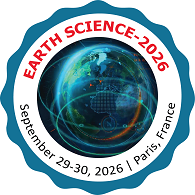Call for Abstract
Scientific Program
7th Global Summit on Earth Science and Climate Change, will be organized around the theme “Theme: "Sustainable Pathways: Innovating for Climate Resilience"”
Earth science-2026 is comprised of keynote and speakers sessions on latest cutting edge research designed to offer comprehensive global discussions that address current issues in Earth science-2026
Submit your abstract to any of the mentioned tracks.
Register now for the conference by choosing an appropriate package suitable to you.

